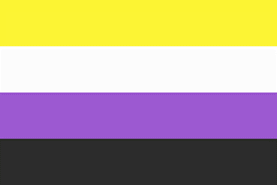International Non-Binary People’s Day is marked annually on the 14th July. This coincides with Non-Binary Awareness Week which this year runs from the 11th – 17th July 2022. The aim of both occasions is to celebrate Non-Binary people globally and raise awareness of the challenges members of the community face.
What is non-binary?
The LGBT Foundation have shared the following definition: Non-binary is used to describe people who feel their gender cannot be defined within the margins of gender binary. Instead, they understand their gender in a way that goes beyond simply identifying as either a man or woman. Some non-binary people may feel comfortable within trans communities and find this is a safe space to be with others who don’t identify as cis*, but this isn’t always the case.
*Cis – ‘The word “cis” comes from a Latin word meaning “the same side.” Cisgender is a term used to describe someone whose gender has not changed from the one they were given at birth’ (LGBT Foundation).
Is non-binary new?
The short answer is no!
Non-Binary and gender nonconforming identities have existed throughout history, you just need to know where to look. Here are some handy Historic England and Britannica articles that explore this in more detail.
What is it like being non-binary in the UK?
Leading LGBTQ+ charity Stonewall explore what it means to be non-binary in the UK today in this article.
How can I be an ally to non-binary people?
Its important that we all take steps big and small to be inclusive and supportive of one another. The charity Stonewall have created a useful list of 10 things you can do to step up and be an ally of non-binary people, you can find it here.
What are we doing to support non-binary members of the KCL community?
We have developed a toolkit full useful guidance on how to support trans & non-binary members of our university community, we have also produced a map of the gender neutral facilities that can be found across our campuses and we have a wider LGBTQ+ inclusion resource hub, you can find all of this and more here.
We are committed to protecting the dignity of members of our university community. We want a university free of bullying, harassment, sexual misconduct and hate crime. You can find advice, support and reporting procedures on our Dignity at King’s pages.
